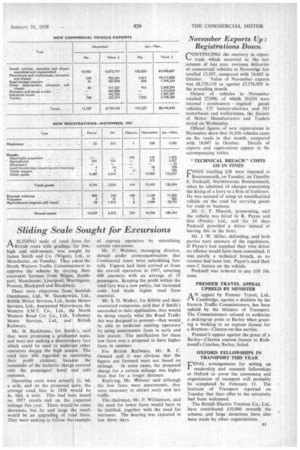Sliding Scale Sought for Excursions
Page 35

If you've noticed an error in this article please click here to report it so we can fix it.
A SLIDING scale of road fares for 1-1 British tours with gradings for low, high and mid-season, was sought by James Smith and Co. (Wigan), Ltd., at Manchester, on Tuesday. They asked the North Western Traffic Commissioners to approve the scheme by varying their excursion licences from Wigan, Southport, Manchester, Liverpool, Warrington, Preston, Blackpool and Blackburn.
There were objections from Scottish Omnibuses, Ltd., W. Standerwick, Ltd., Ribble Motor Services, Ltd., Scout Motor Services, Ltd., Associated Motorways, the Western S.M.T. Co., Ltd., the North Western Road Car Co., Ltd., Yelloway Motor Services, .Ltd., and British Railways.
Mr. H. Backhouse, for Smith's, said they were proposing a graduated scale, and were not seeking a discretionary fare which could be used to undercut other operators during the high season. The road fare was regarded as containing their profit element, because the remainder of the inclusive charge covered only the passengers' hotel and café expenses.
Operating costs were actually 2s. 4d. a mile, and on the proposed *ale, the average road fare in 1958 Would be 4s. Otd. a mile. This had been based on 1957 results and on the expected mileage this year. There would be some decreases, but by and large the result would be an upgrading of road fares. They were seeking to follow the example of express operators by subsidizing certain operations.
Mr. F. Webster, managing director, denied under cross-examination that Continental tours were subsidizing fantails. Figures had been arrived at from the overall operation in 1957, covering 600 journeys with an average of 35 passengers. Keeping the profit within the road fare was a new peilicy, but increased costs had made higher road fares essential.
Mr. S. D. Walker, for Ribble and their associated companies, said that if Smith's succeeded in their application, they would be doing exactly what the Road Traffic Act was designed to prevent-they would he able to undercut existing operators • by using uneconomic fares in early and late season. The justification for these low fares was a proposal to have higher fares in summer.
For British Railways, Mr. R. C. Oswald said it was obvious that the figures put forward were not based on mileage. In some cases, the proposed charge for a certain mileage was higher than that for a 'longer distance.
Replying, Mr. Webster said although the low fares were uneconomic, they were necessary to attract early and late traffic.
The chairman, Mr. F. Williamson, said the need for lower fares would have to be justified, together with the need for increases. The bearing was expected to last three days.




































































































